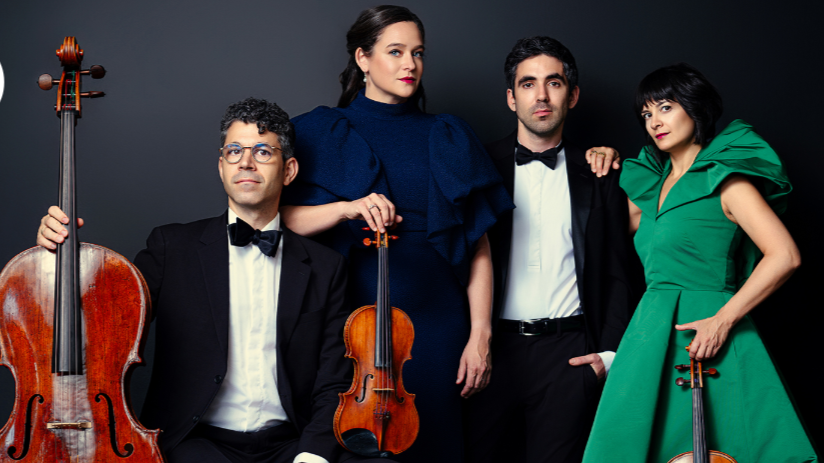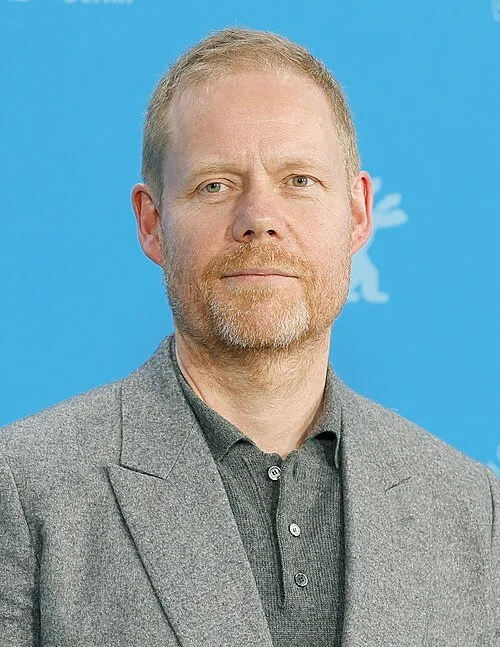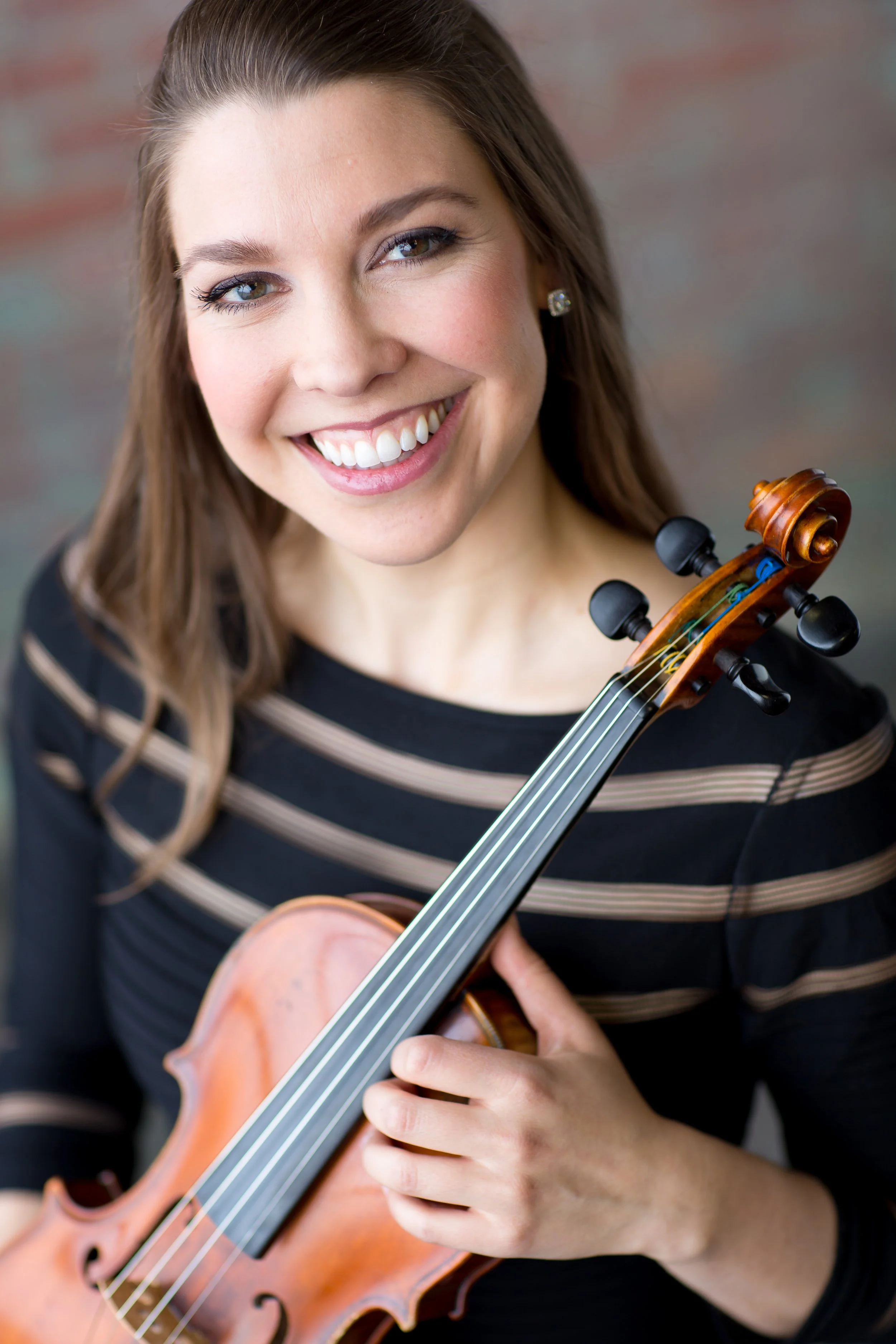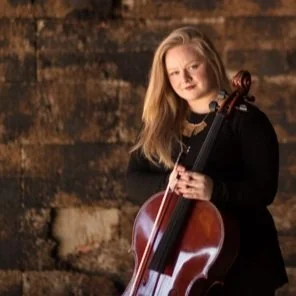In 2012, Max Richter recomposed The Four Seasons in his own voice, imbuing Vivaldi’s famous Baroque motives with a contemporary poignancy that brought worldwide acclaim. Experience the power of this monumental work live inside the breathtaking Chapel of the Incarnate Word, with special guests and Agarita’s own twists.
Program
Antonio Vivaldi | The Four Seasons | Spring | Allegro
Max Richter arr. Agarita | The Four Seasons Recomposed
Spring I, II, III
Winter I, II, III
Summer I ,II, III
Autumn I ( Vivaldi/ Richter), II, III
Program Notes
Arrangements are tricky, especially in the field of classical music. On the one hand, taking something from the Baroque Era and arranging it for modern-day listening can be a great way to resuscitate a work, contextualizing it for audiences who could use a different perspective to understand its expressive power. Great art can be timeless, but the cultural and aesthetic context changes over time. Providing a lens of understanding through an ‘arrangement’ can provide a needed connection between the audience and the underlying essence of a composer’s work. On the other hand, an arrangement that misses or misunderstands that essence, cheapens the original by watering it down, or attempts to go toe-to-toe with the original by competing with its inherent power, can easily leave a listener unsatisfied and craving the pure power of the older work.
So where does the contemporary composer Max Richter fit in, with his brave re-composition of Vivaldi’s already celebrated The Four Seasons? Well, – and this is wise by Richter – it isn’t really an arrangement. For one thing, the instrumentation is virtually the same: violins, violas, cellos, and basso continuo (even including the traditional harpsichord). The essential timbre or sound of the music is not being updated in any way. And yet, Richter chooses not to compete with Vivaldi musically, but instead to take important fragments or motives of his composition and reframe them within his own modern compositional voice. We very clearly recognize the Vivaldi in the Richter, but it’s as if Richter is taking a Baroque fabric and making a contemporary dress out of it. He sees something compellingly minimalistic and modern about Vivaldi’s repeating motives, and offers those motives a new musical home, one that has different expressive goals.
I think for this reason, Richter chose to call his work The Four Seasons Recomposed. “Recomposing” skirts the issue of competing with the original, or even modernizing the original to make it somehow improve it or make it more relevant. Rather, he is using Vivaldi’s masterpiece (and quite a lot of it!) as inspiration for his own expression. If Richter’s homage is successful, it is because Richter has found synergy between Vivaldi’s expressive voice and his own. Vivaldi’s motives are the tools and material, and Richter’s post-minimal structures and contemporary harmonies are the framing.
On this program, a bit of the original Vivaldi (the first movement of Spring, and the third movement of Summer) has been added to Richter’s epic work, and the order of the seasons has been re-arranged: Spring, Winter, Summer, and Autumn. We cannot wait to share this masterpiece, in the perfect space for such a transportive work.
featuring
American violinist Isabelle Ai Durrenberger is praised for her imaginative, striking performances and her ability to communicate with sincere artistry. Currently based in New York City, Isabelle was recently appointed first violinist of the renowned Aeolus Quartet and served as a 2023-25 fellow of Carnegie Hall’s Ensemble Connect program. An avid chamber musician, Isabelle is recognized nationally for her unique collaborative instincts. Her 2024-25 season features solo and collaborative invitations including performances with the Boston Chamber Music Society, Jupiter Chamber Players (NYC), Orpheus Chamber Orchestra in Carnegie Hall (NYC), THe Knights (NYC), and the Grammy-nominated conductorless chamber orchestra, A Far Cry (Boston). In 2022, she completed her graduate studies at the New England Conservatory in Boston with Soovin Kim and Don Weilerstein. Isabelle spent recent summers making chamber music at the Marlboro Music Festival, Lake Champlain Chamber Music Festival, and Four Seasons Spring Workshop. Isabelle also enjoys exploring music through teaching: she has a private violin studio in New York City and serves on the violin faculty at the New England Conservatory Preparatory School in Boston where she teaches violin lessons and coaches chamber music. More information on how to study with Isabelle can be found under lessons. Isabelle’s musical life began at birth; both of her parents are pianists and music educators. She began playing piano at age 4, but her parents noticed that she loved singing and thought she might enjoy “singing” on the violin — she began lessons at age 7. Isabelle grew up in Columbus, Ohio, and was extremely lucky to be introduced to Jaime Laredo at age 13. She attended Meadowmount School of Music for four years, graduated high school a year early, and began her undergraduate program in Cleveland at age 16. She completed her B.M. at the Cleveland Institute of Music where she was mentored by Jaime Laredo for seven years. Her other mentors and influences include Jennifer Koh, Sharon Robinson, Joan Kwuon, Jinjoo Cho, Jan Mark Sloman, and Jun Kim. Isabelle was the Artist Fellow of the 2021 Alone Together educational project led by Jennifer Koh and ARCO Collaborative. This unique introduction to composers such as Tania León, Du Yun, and Missy Mazzoli has inspired her to prioritize programming living composers, especially highlighting female and multicultural composers. Isabelle has received many recognitions and awards for her musicianship. Isabelle was the winner of the 2021-22 Borromeo String Quartet Guest Award and performed alongside the quartet in Jordan Hall. In 2020, she was highlighted as the Featured Young Artist of the Music from the Western Reserve concert series. In 2019, Isabelle won the First Prize and Performance Prize from the Tuesday Musical Competition. She was awarded the Milton Preves Memorial 3rd Prize at the 2018 Irving M. Klein International String Competition in San Francisco, as well as the first prize in the 2017 Cleveland Institute of Music Concerto Competition. Isabelle has collaborated with the Columbus Symphony, Asheville Symphony, Cleveland Philharmonic Orchestra, Naples Philharmonic Orchestra, and Lakeside Symphony Orchestra amongst many others. Isabelle was a semifinalist in the 2022 International Violin Competition of Indianapolis, a semifinalist in the 2021 Young Concert Artists Audition, a candidate in the 2019 Sendai International Music Competition, 2017 Isang Yun Violin Competition, and 2017 Stulberg International String Competition. She has participated in masterclasses with Mihaela Martin, Olivier Charlier, David Chan, Noah Bendix-Balgley, and attended the IMS Prussia Cove in the class of Gerhard Schulz. Isabelle performed several times at Carnegie Hall as a member of the New York String Orchestra Seminar. Born in Taipei in 1998, Isabelle is of Japanese, Taiwanese, and American descent. She performs on a 2020 Zygmuntowicz violin generously loaned to her by a private patron in New York City.
Sandy Lo is a Taiwanese-born violinist Yung-Hsuan (Sandy) Lo is a versatile performer and dedicated educator. She currently serves as Artist Faculty for the Ascend program at the Classical Music Institute in San Antonio, Texas, and was previously a member of the Grand Rapids Symphony. Her performance engagements have taken her across the United States, Germany, China, Korea and Taiwan. Yunghsuan holds a Doctor of Musical Arts in Violin Performance from Michigan State University and a Master of Music from the University of Taipei. Her principal teachers include Tao-Chang Yu, Dmitri Berlinsky, and Chiu-Sen Chen. She has appeared as a guest artist at Bard Music Colombia and is passionate about mentoring the next generation of musicians through culturally responsive and community-focused teaching.
Emily Herdeman Kelly enjoys a diverse career as a violinist and music educator. An experienced orchestral musician, Ms. Kelly has performed with Northwest Sinfonietta, Oregon Symphony, Houston Symphony, Austin Symphony, Wisconsin Chamber Orchestra, Houston Grand Opera, Houston Ballet, River Oaks Chamber Orchestra, San Antonio Symphony, and the New World Symphony. She performed on the Grammy Award-winning recording of Wozzeck with the Houston Symphony. In the summer she can be seen performing at the Britt Festival Orchestra (OR), and has also played with Colorado Music Festival Orchestra (CO), Tanglewood Music Center (MA), and Round Top Festival Institute (TX). A dedicated teacher, she has served as a Teaching Artist with the Seattle Symphony, an Adjunct Instructor at Carnegie Mellon University and was on faculty at the Rice University Preparatory School. In addition she has maintained private studios in Washington, Pennsylvania, and Texas for students of all ages and levels. She was recently recognized as a Distinguished Young Teacher by the Suzuki Association of the Americas. She holds a Bachelor of Music in Violin Performance, a Bachelor of Arts in Economics and a Liberal Arts and Management Certificate from Indiana University, and a Master of Music from Rice University.
A native of the Washington DC area, violinist Aimee Lopez officially became a Texan when she joined the San Antonio Symphony in 2008 after completing a coveted four year fellowship with The New World Symphony under the direction of Michael Tilson Thomas. She is also a violinist with The Colorado Music Festival Orchestra in Boulder, Colorado. She has performed on stages throughout Europe, performing a month-long residency of Gershwin's Porgy and Bess at L'Opera Comique in Paris and The Alhambra in Spain. Aimee has given solo recitals and collaborated on chamber concerts in Washington DC, Baltimore, Houston, Boulder and Santa Cruz. Aimee has a passion for nurturing young minds and hearts through music. She directs a busy private violin studio where she actively develops the talents of young people on a weekly basis. Prior to her engagement in San Antonio, she earned degrees from The Peabody Institute and Rice University’s Shepherd School of Music where she studied under Elisabeth Adkins, Violaine Melancon, Shirley Givens, and Kathleen Winkler. Aimee lives in San Antonio with her husband, Dave, stepson, David and the newest addition to the family: two year old son, Gus
Violist Christopher McKay enjoys a diverse career as an orchestral and chamber musician. He has been a member of The Phoenix Symphony since 2008 and performed as the Acting Assistant Principal Viola from 2009-2022. As a passionate chamber musician he is a founding member of Urban Nocturnes, a modular chamber music ensemble dedicated to traditional repertoire as well as exploring music of living and underperformed composers. As a Phoenix based ensemble they are currently Artists-in-Residence at Trinity Episcopal Cathedral in downtown Phoenix, AZ. Previous solo and chamber music performances include J.S. Bach’s Brandenburg Concerto No 6 with the Arizona Bach Society in 2022, Richard Strauss’ Don Quixote in 2006 and Mozart’s Sinfonia Concertante for Violin and Viola in 2004 with the Evansville Philharmonic Orchestra. From 2018-2022 he performed annual chamber music concerts with the Red Rocks Music Festival in Phoenix and Sedona. His other orchestral experience include performances with the Utah Symphony, Indianapolis Symphony, repeat summer engagements with the Grant Park Orchestra in Chicago, and has held positions in the Louisville Orchestra, Central City Opera Orchestra, Lancaster Festival Orchestra, Evansville Philharmonic, Owensboro Symphony, and Baton Rouge Symphony. In1998 and 2006 he was a fellow at the Tanglewood Arts Center where he worked with some of the world’s greatest conductors including Seiji Ozawa, Bernard Haitink, James Levine, Robert Spano, and James Conlon. From 2001-2007 he was a member of the Eykamp String Quartet, a consortium position between the Evansville Philharmonic Orchestra and the University of Evansville. In addition to performing numerous concerts per year at the University, the quartet members taught chamber music and private lessons as Adjunct Instructors, held Principal positions in the Philharmonic, and performed regularly at schools and community concerts through education and outreach programs. Christopher received his viola performance degrees from Louisiana State University (BM) and Indiana University (MM). His primary teachers were Alan deVeritch, Jerzy Kosmala, and Julian Wilkison, with additional instruction from Paul Neubauer and James Dunham.
Cellist Morgen Johnson has distinguished herself as a versatile artist whose wide-ranging musical abilities and passionate performances have taken her to stages across North America and Asia. Her artistry has been featured in such prestigious venues as Carnegie Hall, Avery Fisher Hall, and the Shanghai Grand Theater, where her expressive playing and creative enthusiasm have earned her recognition as both a soloist and collaborator.
Originally from Michigan, Morgen studied at The Juilliard School and Rice University, where she trained with renowned cellists Bonnie Hampton, Norman Fischer, and Christopher French. She has since built a career that balances orchestral, chamber, and solo performance with a strong commitment to community engagement and education.
A devoted chamber musician, Morgen has performed with ensembles such as Urban Nocturnes and Downtown Chamber Series in Phoenix, Olmos Ensemble, Camerata San Antonio and Agarita in San Antonio, and has worked with world-renowned groups including the Juilliard String Quartet, Maia Quartet, and Pacifica Quartet. As a founding member of the Toomai Quintet, she won first prize in New York’s 92nd Street Y Chamber Music Competition in 2007, establishing the ensemble as a vibrant presence in the chamber music world.
Morgen is also an accomplished orchestral musician. A former member of the San Antonio Symphony, she performs each summer with the Colorado Music Festival Orchestra. Ms. Johnson was a fellow with the Tanglewood Music Center Orchestra in the summers of 2006-2007, and she has since played with orchestras including the Houston Symphony, Sarasota Orchestra, Mid-Texas Symphony, and Traverse Symphony Orchestra. In 2021, Ms. Johnson joined the Phoenix Symphony where she has explored new musical collaborations while experiencing the vibrancy of the city.
Beyond the concert stage, Morgen is passionate about using music to connect with audiences of all ages. She regularly participates in outreach performances, bringing chamber music into schools and community spaces, and she is committed to inspiring the next generation of musicians. Ms. Johnson also plays at numerous shelters around Phoenix in hopes of bringing respite to underserved communities.
Morgen lives in Phoenix with her husband, cellist Ryan Murphy, and their daughter Tallulah, where she continues to pursue her mission of sharing music as a force for creativity, connection, and joy.
Born in Toronto and raised in Ottawa, Canada, Jeremy McCoy received his earliest musical training on the piano and as a chorister. He was first introduced to double bass in middle school and, through high school, studied privately with David Currie. Summers spent at Interlochen and with the National Youth Orchestra of Canada included lessons and orchestral coaching with Oscar Zimmerman, Winston Budrow and Thorvald Fredin. With assistance from the Canada Council for the Arts, Jeremy continued his studies at the Curtis Institute of Music with Roger Scott, earning a Bachelor of Music degree. While at Curtis, the school orchestra toured to Europe and performed with legendary conductors Leonard Bernstein and Sergiu Celibidache. Another highlight of Jeremy’s student years was the opportunity to work with maestro Klaus Tennstedt as Principal bass of the Canadian Chamber Orchestra. At age twenty, Jeremy won a position with Canada’s National Arts Centre Orchestra. The following season he joined the Metropolitan Opera Orchestra. Over the course of thirty-five seasons, Jeremy played more than 5,000 Met performances under music directors James Levine and Yannick Nézet-Séguin, guest conductors Carlos Kleiber, Kirill Petrenko, Seiji Ozawa, Ricardo Muti, Daniele Gatti, Simon Rattle, Christian Thielemann, Daniel Barenboim and others. He retired from his chair as Assistant Principal double bass in May, 2020. Apart from his orchestral career, Jeremy has appeared in recital at Lincoln Center, on CBC Radio and for the International Society of Bassists. He has performed as concerto soloist with the Atlantic Chamber Orchestra, the Louisiana Philharmonic, Classical Tahoe, the Ottawa Symphony Orchestra and Musica Viva of New York. As a chamber musician, he has collaborated with members of the Arditti, Borodin, Cleveland, Emerson, Guarneri, Juilliard and Tokyo string quartets and with many other eminent and emerging artists. His summer festival appearances include Marlboro, Mostly Mozart, Rockport Music, Banff, Classical Tahoe, Kneisel Hall, Grand Tetons, Bowdoin, Festival Napa Valley, Close Encounters with Music, Lincoln Center Festival, Affinis Festival (Japan), Appalachian Summer Festival, Ottawa International Music Festival, Music and Beyond, Music Festival of the Hamptons and Cooperstown Chamber Music Festival. With the New York City contemporary music groups Speculum Musicae, Sequitur and Ensemble Sospeso, Jeremy has taken part in many premiere performances and recorded chamber works by modern masters including Elliott Carter, David Del Tredici and Thomas Ades. Jeremy has performed on symphonic and operatic recordings, several of which won Grammys, for Deutsche Grammophon, Sony, London-Decca, Phillips, Erato and CBC Records and chamber works for Koch Classics, Albany, Naxos, CRI, Mode Records and Concord Jazz. As a studio session player, he has performed as both solo bassist and section leader on dozens of feature film soundtracks and recorded string tracks for a diverse group of popular artists including Bruce Springsteen, David Byrne, Lou Reed, Sting and Natalie Merchant. Jeremy’s two solo recordings have garnered both popular and critical praise. An eclectic collection of duos, Dialogues with Double Bass, was released on Bridge Records in 2005. Baroque Legacy (2012), featuring the gamba sonatas of JS Bach, is available on MSR Classics.
While based in New York City, Jeremy served on the faculties of the Manhattan School of Music, Bard College Conservatory of Music, the Cali School of Music at Montclair State University, Columbia and Penn State Universities, Queen’s College CUNY, the National Youth Orchestra of Canada and Bowdoin International Music Festival. He has presented master classes at leading schools of music across the United States, in Canada, Sweden and Japan and written articles for Strings Magazine. Now making his home in San Antonio, Texas, Jeremy teaches privately and performs both locally and away. His institutional and private students hold positions with orchestras throughout North America, Europe, Australia and East Asia and have made careers in both college and public school music education. Jeremy performs on an exceptional instrument made by the Venetian luthier Domenico Busan and on double basses by Alfred Meyer of Markneukirchen, Germany and Tetsu Suzuki, Cremona, Italy. He uses strings from Pirastro.









